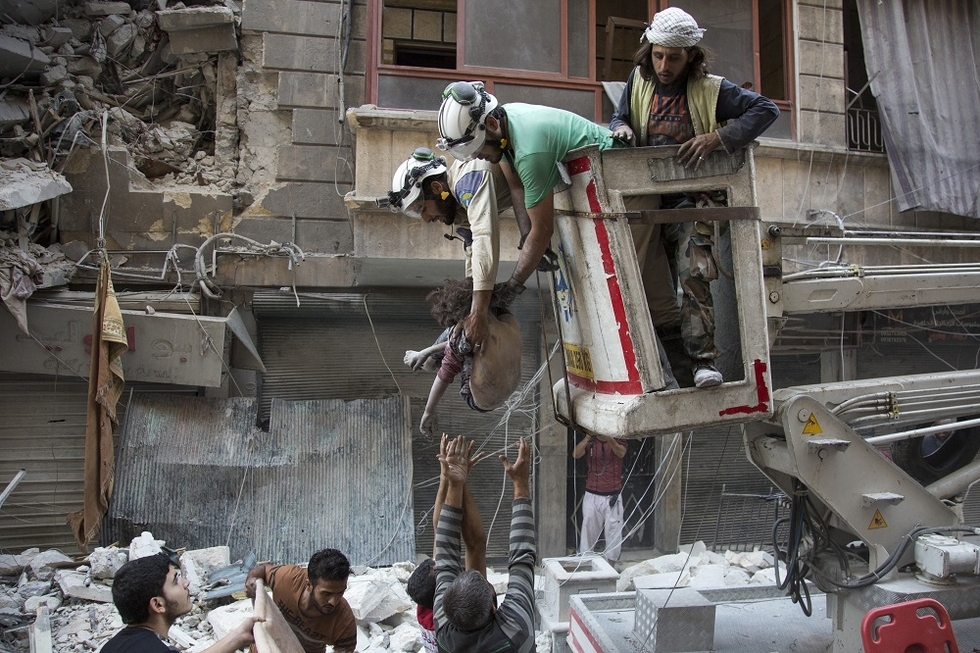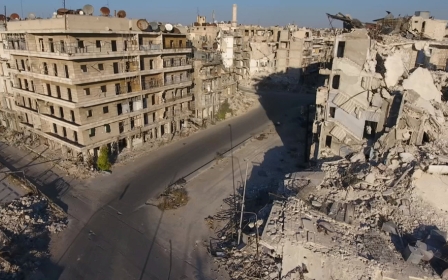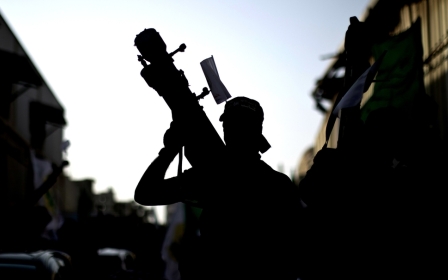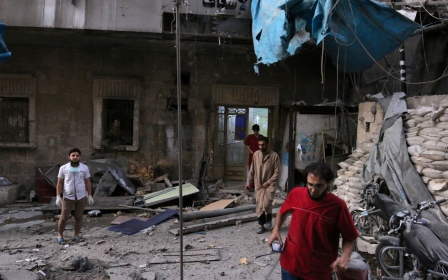Aleppo civilians fear ‘massacre all over the city’ if Assad takes control

ALEPPO, Syria - Residents in rebel-held East Aleppo say they fear a city-wide massacre if forces loyal to Syrian President Bashar al-Assad and their Russian allies manage to crush opposition in the last major urban stronghold held by the rebels.
The Syrian army began a three-pronged military offensive on the rebel-held parts of the city over the weekend, with Russia also stepping up air strikes that have taken aim at hospitals, markets and water facilities.
According to rebel sources inside the city, more than 300 people, including many women and children, have been killed in just a few days, making this one of the most brutal offensives in Syria since the uprising against the government first broke out more than five years ago.
“If the regime advances to take the whole of eastern Aleppo… there'll be a massacre all over the city,” said Morad Jabole, a 38-year-old chemistry teacher who has lived in Aleppo with his young family for three years.
Badr Mohamed, another resident, echoed the sentiment, saying that if east Aleppo fell there would only be “more bloodshed and devastation” as the government and its allies began to carry out revenge attacks on civilians under the guise of crushing terrorism.
In spite of the risks, both Jabole and Mohamed said they thought the rebels would be able to hold on to at least some of east Aleppo, dismissing the idea that the city was about to fall.
“I can't imagine such a thing would happen after almost six years of fighting,” Jabole said.
A scenario in which the fighters would be allowed to leave while civilians stayed on, which has happened in other besieged parts of Syria, is unlikely, he added, stressing that the situation was changing too quickly for people on the ground to have a clear idea of what actually awaits them.
Mohamed said that while he thought the city was “more likely now to fall,” he did not believe Aleppo was lost. Instead, he said he envisioned an “endless war” with the government marching slowly and both sides taking heavy losses.
This week, fresh attacks on medical facilities put the largest hospital in east Aleppo out of service and destroyed several ambulances, leaving the dying and wounded with nowhere to go. At least 100 children have been killed in less than a week, UNICEF said late on Wednesday.
“I think the siege will continue and the regime will keep making daily attacks on eastern Aleppo,” Mohamed told Middle East Eye. “But while he [Assad] might recapture some areas now or in the future, he won’t be able to take the whole city. The rebels will be able to stay in a position to defend parts of the city, and the urban nature of Aleppo [where many buildings are close together] means they will be able to defend the city more easily than we have seen in less urban areas like Daraya.”
Daraya, just west of Damascus, was evacuated this summer after a long siege by the government that led to widespread allegations its civilians were being forcibly starved into submission.
Still, for all the determination to hold out against the renewed offensive, some in Aleppo say they simply cannot take it anymore.Rwaa Jamal, a 29-year-old aid worker from east Aleppo, said that she wanted to leave as soon as a safe way out of the city opened up.
“I am really frightened because of the crazy bombing. I have never seen such an intense bombardment before and I can't bear it,” she said. “I'm afraid to go out and get food or water, which has been cut for almost a week, but I have no choice.”
In recent days, the government and its allies have been dropping leaflets on east Aleppo, telling people to leave, but Jamal says she thinks this is little more than a stunt.
“I see these leaflets as a threat, telling us to go out of the city,” she said. “This is not a nice call from our government telling us to come back to them. I just don’t buy it. It is all nonsense. If they were really serious, they would stop the shelling and give us a humanitarian road to leave and go wherever we want. Instead, they are pretending to have opened a road for civilians but have at the same time bombed us.”
In August, Russia and the Syrian government announced a temporary ceasefire and said they would open humanitarian corridors for civilians to leave, but the promises failed to materialise and reports said the paths out of rebel-held Aleppo were either blocked or bombed. Again, the government and Russia blamed the rebels, while the rebels blamed the government.
Since then, the government siege of Aleppo has only tightened as the bombing has grown more intense.
Jabole said that even as the war has dragged on and the situation deteriorated, he chose to stay on in Aleppo because he has never lived anywhere else.
“This is where I belong. I was born here,” he said. “But the situation is getting more intense by the day and if this continues I think I may leave and return when the war ends.”
Shade Derar, a 41-year-old shop owner from the al-Zebdia neighbourhood, which has suffered heavy bombing in recent days, said he has ignored the leaflets and government calls to abandon rebel-held Aleppo for the government-held west.
“The regime has been doing this for more than two years now, asking us to go to their side or face the consequences of bombardment that will be unleashed on those who stay,” he said. “But they have been shelling us for more than four years. Before, we had a choice, but since the siege was enforced, we have not had any way out.
“Even if we did, I do not trust that life would be better there. I don't think they will put me in jail, but they will not fulfil their promises of providing a good living or proper home, and conditions will be as bad as they are here. One of my relatives moved to the government area before the siege, but he told me that they were given some basic stuff at the start and have not received anything since, and that there was no water, food or medicine in the camp where they were placed.”
This article is available in French on Middle East Eye French edition.
Middle East Eye propose une couverture et une analyse indépendantes et incomparables du Moyen-Orient, de l’Afrique du Nord et d’autres régions du monde. Pour en savoir plus sur la reprise de ce contenu et les frais qui s’appliquent, veuillez remplir ce formulaire [en anglais]. Pour en savoir plus sur MEE, cliquez ici [en anglais].





